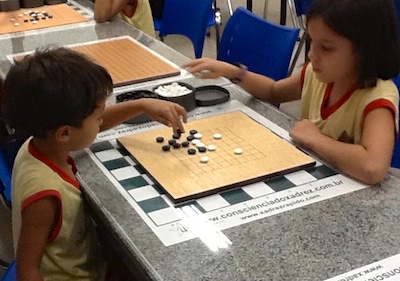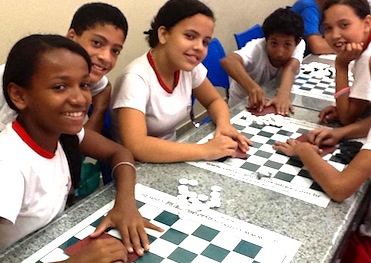Project “Go at School”
Full Time Municipality School of Caroline Campelo Cruz e Silva (Palmas City, Brazil)
The implementation of full time schools in the municipality of Palmas-TO caused changes in the form of organization of educational work and curriculum design in these schools. The additional time the students stay in the school opened up new space for teaching activities not formally acknowledged as school activities before. Among these new spaces is a room properly equipped for teaching chess and checkers.
 The first contact with go came about through research about these two games on the Internet. We found out that there was another game, an oriental game played with glass spheres on a wooden board that is related to chess and checkers.
The first contact with go came about through research about these two games on the Internet. We found out that there was another game, an oriental game played with glass spheres on a wooden board that is related to chess and checkers.
In 2010 we received our first go board at the school in Palmas. At the beginning it was just curiosity about an ancient game still practiced today. Go has gained our attention thanks to its relationship with mathematics. Even more than chess and checkers, because the game demands calculation activities all the time. We also think that looking at the different shapes built on the board and dealing with the delicate goishi could also help develop motor coordination and laterality, both very important in the literacy process.
In 2012 the first project to teach go to all students in the school was elaborated. For two months the students will have specific go lessons. We will also continually offer workshops to be held after the regular classes, where students will have access to the game of go throughout the school year.
The work being carried out with the game of go aims not only to promote it in the school, but also to support the development of the logical thinking of students and the working content of basic math in a fun and exciting way, to stimulate the organization in the management of school items, especially the school notebook, to encourage values in relation to the productive use of human reasoning, and to promote an understanding of their role in building a better society. The go sets were built with the help of students using ethyl vinyl acetate, a sort of rubber very popular in Brazilian schools for the construction of inexpensive teaching materials. Students were encouraged, due to the low cost of this product, to produce their own game sets. This will also help promote go outside of the school. The schedule of activities also provides a workshop for teaching the basics of the game to other teachers so that they can also work with go in an interdisciplinary way. Board games are also an ordinary human language, which may facilitate the approach of our students to people from other places, other cultures and other languages. To help with this topic, the Kiseido Go Server will be implemented in the school computer room, so that students can use the network to play.
 According to Abrago (the Brazilian Go Association), this is the first experience with go in Brazilian schools, so we believe the project will pass through successive revisions, however, the way the modality was received by students is a sign that it has come to stay. For the student Sara Beatriz Santos Nogueira, 5th year of elementary school, go has changed the experience she had with board games. In a report presented to the classroom teacher, she says that the game is wonderful, very enjoyable to play. Students Junior Vilson Ferreira and Jorge Marques dos Santos Victor fell in love with the game and in the second week of the project at the school signed up for the workshop held after school hours. According to Vilson, go is the best game he has ever played.
According to Abrago (the Brazilian Go Association), this is the first experience with go in Brazilian schools, so we believe the project will pass through successive revisions, however, the way the modality was received by students is a sign that it has come to stay. For the student Sara Beatriz Santos Nogueira, 5th year of elementary school, go has changed the experience she had with board games. In a report presented to the classroom teacher, she says that the game is wonderful, very enjoyable to play. Students Junior Vilson Ferreira and Jorge Marques dos Santos Victor fell in love with the game and in the second week of the project at the school signed up for the workshop held after school hours. According to Vilson, go is the best game he has ever played.
The next step is to check the impact of the practice of the game in school in order to propose the project also to other teaching units. Board games are still new in the school environment in Brazil. Chess, which is most widespread in schools, is usually used by teachers who do not have access to this culture in their academic training.
We thank Abrago who have at all times shown interest in providing educational materials, technical guidance, and helping further in the dissemination of the work, making possiblet the implementation of this initiative. I, the students and the school are particularly grateful to two people who were essential to the success of the project: Roberto Petresco and Everson Batista da Silva, without them we would not have succeeded.
– Luciano Sanches Teixeira, teacher
